|  | |
 |
| Kudos to our research teams | 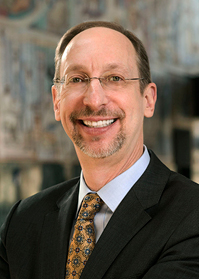 |
Congratulations to research teams from the Woodruff Health Sciences Center, and indeed across all of Emory, on another record-shattering year of research funding! Emory University's external sponsored research funding totaled $734 million for FY2018--an impressive increase of 17% over last year. Of that total, WHSC investigators received more than $685.8 million. In the health sciences alone, that represents a phenomenal $101 million increase over last year.
This outstanding new record just confirms what I've known since joining the Emory family in 2016. We have one of the most talented, industrious, resourceful, and dedicated research enterprises in the nation. Our research faculty, staff, and administrative teams come together to develop proposals with enormous potential to save and improve lives and transform the ways in which we prevent, detect, and treat disease.
Thanks to each of you for making this extraordinary year possible. I look forward to all that you will accomplish in FY 2019 and beyond.
Jonathan S. Lewin, MD, FACR
Executive Vice President for Health Affairs, Emory University
Executive Director, Woodruff Health Sciences Center
CEO, President, and Chairman of the Board, Emory Healthcare
Please direct questions and comments to evphafeedback@emory.edu. | |
| |
| 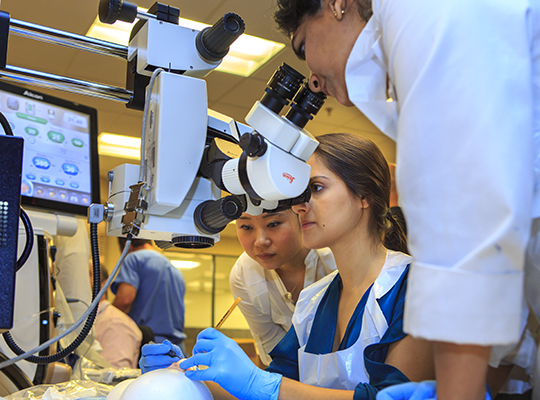 | Emory research funding for FY 2018 increases 17% over last year | Research funding from external sources in FY 2018 was the largest in Emory's history, totaling $734 million, a 17% increase over $628 million in FY17.
Federal agencies awarded $440.8 million, or more than 60% of the total, led by the NIH, with $359 million in awards. NIH funding represented nearly 82% of total federal dollars awarded to Emory.
Researchers in the WHSC received more than $685.8 million in FY18, or nearly 93% of the university total, with $402.5 million in federal funding, including $359.2 million from the NIH. The WHSC breakdown is as follows:
- Medicine: $456.3 million
- Public Health: $132.9 million
- Yerkes: $74.7 million
- Nursing: $18 million
- Executive VP for Health Affairs: $3.5 million
"Faculty have worked hard to increase the number of proposals submitted to granting institutions, and their effort continues to pay off in greater numbers of awards," says David Stephens, VP for research in the health sciences.
Examples of Emory's externally funded research projects in FY 2018:
- $51 million over five years from the NIH for the Georgia Clinical and Translational Science Alliance
- $37 million from the Bill and Melinda Gates Foundation for continued support of the Child Health and Mortality Prevention Surveillance Network
- $15 million from the Marcus Foundation to create the Marcus Stroke Network and $13 million to study stem cell options to treat osteoarthritis
- almost $4 million from the National Highway Traffic Safety Administration to study motor vehicle crashes in metro Atlanta that resulted in injuries treated at Grady
- $4.7 million from USAID to establish a physical therapy profession in the country of Georgia
- $1.7 million from the National Institute of General Medical Sciences to Rollins to help guide norovirus vaccine decision-making through mathematical modeling
- $2.7 million from Health Resources and Services Administration to nursing to increase the community-based nursing workforce
Read more. | |
| |
| 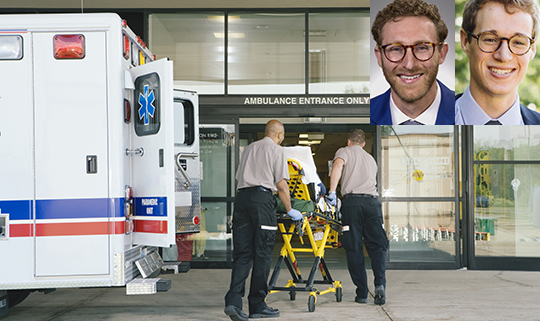 | | Upper right: Medical student Michael Arenson and nursing student Colin McNamara | Student initiative to cool down cost hot spots | A small group of Emory students from the schools of medicine, nursing, public health and law have banded together to try to curb health care costs by bringing a national initiative to Atlanta. The Interprofessional Student Hotspotting Learning Collaborative in Atlanta is an affiliate of a national initiative established by the Camden Coalition of Healthcare Providers.
The interdisciplinary student hotspotting teams target the medically and socially complex patients who constitute 5% of Grady’s patients but account for 50% of its health care costs—the “hot spots.” The teams work to cool those spots down, but not by providing medical care or advice. Instead, they help these patients manage their conditions to keep them out of the ER and the hospital in any way they can.
Students visit patients in their homes, or, if the patient is homeless, wherever they can. They accompany patients to a doctor’s appointment. "We try to find out what they need to keep their condition stable," says Michael Arenson, a fourth-year medical student who has been working to bring the initiative to Emory for the past three years. "Sometimes that means making sure they are taking their meds correctly, or making sure there is not a significant amount of mold in their house. It can also mean supporting them to get an ID that they need for a job. We don’t do it for them. The whole idea is to help them become self-sufficient."
Arenson worked with Colin McNamara, a family nurse practitioner student, and three other students to lay the ground work for the initiative last year. This year the program has attracted 32 students (Arenson actually had to turn some students away) representing eight disciplines from four academic institutions—Emory schools of medicine, nursing, public health, and law as well as an undergraduate, Georgia State University schools of law and social work, Mercer University College of Pharmacy, and Philadelphia College of Osteopathic Medicine.
The Atlanta team is sponsored through a seed grant provided through a partnership among the Emory/Georgia Tech Healthcare Innovation Program, the Georgia Clinical and Translational Science Alliance, and Georgia State University. Additional funding has also been received from Emory’s Primary Care Consortium as well as discretionary research funds allocated by Linda McCauley, dean of nursing.
The students have been divided into four teams of eight, and each team will work with five patients, for a total of 20. "Twenty patients may not sound like much, but if you look at the cost to treat this group, we hope to save Grady a good bit of money," says Arenson. "We also hope to improve these patients' quality of life. And finally, we are giving students a unique interdisciplinary education opportunity."--Martha McKenzie | |
| |
|  | Helping patients with mild cognitive impairment | A new program at the Emory Brain Health Center will tackle early declines in memory, a condition affecting up to 20% of Americans over 65. The Mild Cognitive Impairment (MCI) Empowerment Program is made possible by $23.7 million in grants from the James M. Cox Foundation and Cox Enterprises.
The program will include a therapeutic day program for participants and caregivers, new technologies and innovations, research outcomes based on real-world function, and an environment that helps patients and their families take control over their health.
According to Allan Levey, director of the Goizueta Alzheimer's Disease Research Center, lifestyle and behavioral research will be a major focus of the program. He says that learning more about patterns of exercise, diet, sleep, socialization, and other activities has tremendous potential to impact the disease and the quality of life of those affected.
"We have for many years given advice to patients and families to pursue healthy activities, but we have not had the tools to effectively measure their progress and to rigorously define the potential impact," says Levey.
More frequent contact and interaction with patients participating in day programs or other activities will allow researchers to refocus outcome measures using real-world function, at home and in the community, rather than outcomes based on artificial pencil and paper tests of memory and function during annual exams.
"Instead of measuring decline year by year, changes can be measured week to week, providing a comprehensive continuum of care," says Levey. "We hope to create an environment and approach that empowers those affected by MCI to take control over factors that might influence their disease course and to integrate this approach into more effective health care."
In this program, Emory will partner with Georgia Tech's Institute for People and Technology and the SimTiGrate Design Lab. They will work together to test and refine new technologies and innovations in built environments that promote health, including the use of wearable devices and innovations for the home for those with MCI. Read more. | |
| |
| 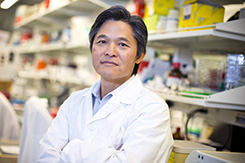 | | Industry agreement targets atherosclerosis therapies | Celltrion recently signed an incubation agreement with Emory to jointly research and develop new drug candidates for atherosclerosis. Celltrion will share its accumulated biologics development expertise and provide research costs and manufacturing materials of new drug candidates. The company is collaborating with the research team led by Hanjoong Jo (biomedical engineering). Read more.
| | |
| | | 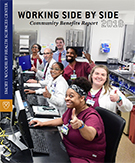 | | Community benefits, FY18 | In fiscal year 2018, Emory Healthcare provided $89.1 million in charity care and $103.3 million to support teaching and research in the health sciences. Emory medical faculty provided $36.3 million in uncompensated care at Grady Hospital. And the Woodruff Health Sciences Center had a $8.8 billion economic impact on the local economy. For these and other figures, see the 2018 Community Benefits report.
| | |
|
| |
| 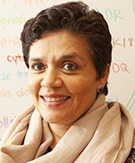 | | New center for neurodysfunction and inflammation | Emory is forming the new Center for Neurodysfunction and Inflammation (CNI) for the study of brain inflammation, a critical mechanism in several chronic diseases of the nervous system and in neurodegenerative diseases. Evidence is accumulating that chronic brain inflammation drives the progression of Alzheimer's and Parkinson's and contributes to autoimmune conditions such as multiple sclerosis. The CNI director is Malú Tansey (physiology). Read more.
| | |
| | | 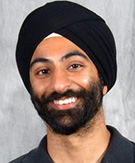 | | EGHI launches refugee health/wellness alliance | The Emory Global Health Institute has established the Refugee and Immigrant Health and Wellness Alliance of Atlanta (RIHWA), which seeks to improve the health of Atlanta’s refugee and immigrant communities as well as social services available to them. RIHWA is a partnership among Emory, Georgia State, the DeKalb County Board of Health, CDC, Georgia's refugee resettlement agencies, health care providers and clinics, and numerous community organizations. Parminder Suchdev, EGHI associate director, helped establish the alliance.
| | |
|
| |
| | Support for Marcus Society | The Marcus Foundation has given a new gift of $5 million to the Department of Pediatrics to renew support for 15 pediatric physician/researchers in the Marcus Society in Pediatrics. The society was launched in 2005 and elevated in 2012 with a $5 million gift. It serves as an "intellectual home" for the Marcus Professors, who practice medicine at Children's Healthcare of Atlanta and conduct research in labs at Emory. Read more.
| | |
| | | | EHC outpatient care ranked fourth nationwide | Vizient, Inc., ranked Emory Healthcare's Physician Group Practices fourth in the nation for ambulatory care quality and accountability, among participating academic medical centers. Vizient is the largest member-driven, health care performance-improvement company in the country. The award recognizes academic medical centers for excellence in providing high-quality, patient-centered, efficient, and effective outpatient care. Read more.
| | |
|
| |
| | 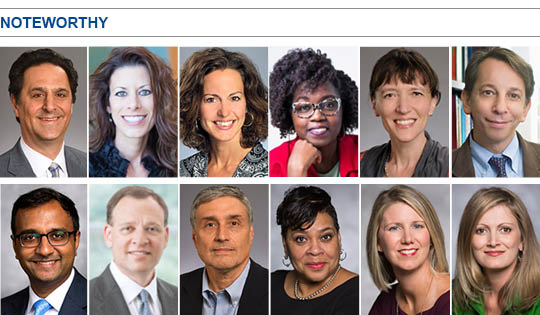 | | Douglas Ander (emergency medicine) has been appointed director of Interprofessional Education (IPE) for the medical school. He has led IPE efforts in the school for the past 11 years.
Carla Berg (public health, behavioral sciences and health education) was named by Atlanta Business Chronicle as a 40 under forty honoree.
Erica Brownfield (internal medicine) is now associate dean for medical education, a role in which she assumes overall responsibility for the MD curriculum in the medical school.
Jasmine Clark (nursing school) won District 108, in Gwinnett County, in the Georgia House of Representatives, beating incumbent Clay Cox.
Hannah Cooper (public health, behavioral sciences and health education) was selected as the inaugural Rollins Chair in Substance Use Disorders.
Ami Klin, director of the Marcus Autism Center and a Georgia Research Alliance Eminent Scholar, received the 2018 Ruane Prize.
Anant Mandawat is the new director of Winship Cancer Institute's cardio-oncology program.
Andrew Patterson will be the new chair of anesthesiology in the medical school, effective January 1.
Guido Silvestri (Yerkes) has been appointed interim chair of pathology in the medical school.
Four of those honored with Emory's 2018 Award of Distinction are in the health sciences: Tammyjo Best, Jennifer Daly (not pictured), Michelle James, and Maya Meeks. | |
| |
| Feb. 28 - March 1, 2019: Georgia CTSA Science Conference, Callaway Resort and Gardens. Register.
March 25: Medical Education Day. Plenary speaker Calvin Chou. Theme of communication in medicine.
| | |
| | | March 27-28, 2019: Winship Scientific Symposium and Poster Session, HSRB 1st floor, Rollins Auditorium. Contact Judy Fortin.
Call for abstracts: May 31-June 1, 2019: National LGBTQ Health Conference, Bridging Research & Practice.
| | |
|
| |
|

